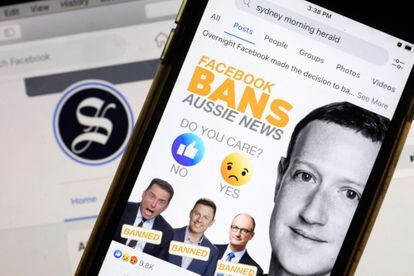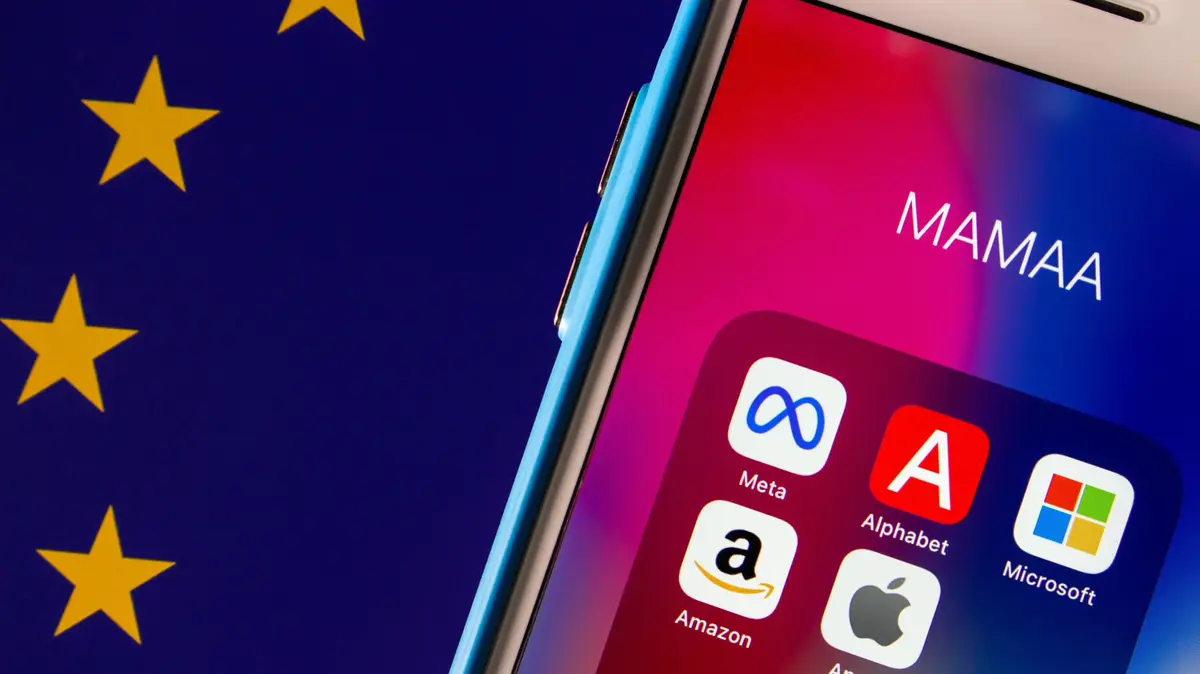On May 6, 2021, a torrent of elegies invaded Twitter updates from the journalism and technology sector.
Another application that made life easier for users was closing.
Caía Nuzzel, a news aggregator that chronologically presented the articles most shared by
friends
(understood here as the people who are followed) and selected the information replicated between
communication
influencers
in the last 24 hours.
Functional, orderly and clean, the tool created by the founders of the old social network Friendster was a practical oasis that measured the pulse of today, without having to consume the controversy of instant combustion and waves of daily indignation that often muddle the experience. from Twitter.
More information
Who puts order in the lack of control of social networks?
How to get social media out of the swamp
“That Twitter buy Nuzzel to close it causes me absolute sadness.
I used it every day, so many times, and it had replaced Twitter on my phone.
Nuzzel is what Twitter should be for users, ”tweeted Chris Sacca, one of Twitter's earliest investors and one of the most followed figures in the tech industry.
At his farewell, Sacca said he had been "happier and a much healthier person" since he had changed one application for another on his mobile phone.
In essence, his was not a simple goodbye to a practical application.
The investor spoke of the return by obligation to a toxic digital consumption experience.
“In this era, not only
who
is
online
has changed, the key is
what
is
online.
[The Internet] will be much more likely to be biased, to disempower us, or it will simply be boring and simple, ”says Jessa Lingel, PhD in Digital Communication, author of
The Gentrification of the Internet: How to Reclaim Our Digital Freedom
The Gentrification of the Internet: How to reclaim our digital freedom, edited by the University of California Press.
A professor at the University of Pennsylvania, Lingel analyzes in the text how the hyper-commodification of virtual platforms hinders the autonomy of minorities, why the 2008 crisis pivoted the flow of investment from Wall Street to Silicon Valley and how the ethics of called
big tech
(Amazon, Apple, Facebook, Google and Microsoft) has impoverished our experience on the internet.
"You no longer compete to make a technological space that will improve, but to consolidate the monopoly and eliminate competition," says the academic.
If you want to support the development of news like this, subscribe to EL PAÍS
Subscribe
What happened with Nuzzel is yet another example of a
modus operandi
in force for the last 15 years: a free-use application is born, triumphs due to its complicity with users, reaches a peak in popularity and ends up closing or being absorbed. If you choose to resist and not sell yourself, you will end up being copied and, therefore, doomed to disappear or lose influence. Facebook bought WhatsApp and Instagram, and since it could not acquire the Snapchat messaging application even for the 9,000 million euros it offered, it launched a service traced to Instagram, Stories (content that disappears 24 hours after being published). In just one year it managed to exceed the figures of the original application. This week, without going any further, the US Federal Trade Commission (FTC) offered the data that Microsoft, Apple, Google, Facebook and Amazon made 616 small acquisitions from 2010 to 2019 that,Due to their size, they did not appear in the competition reports.
Lingel applies the metaphor of gentrification to put context to this drift: “In a gentrified neighborhood, what usually happens is that a small number of wealthy people move to your area and displace the usual residents.
Over time, this neighborhood becomes less diverse and more homogeneous in its offer.
This is what is happening with
online
communities
:
diversity and other points of view are being expelled, leaving us with platforms that tend to the center ”, he summarizes in an email exchange.
That "good internet"
In 2008, 20% of students graduating from business schools in the US worked in finance, and 12% in technology. A decade later, according to CNN, the percentages had been swapped, from 13% specialist in goods to 17% in the
techie
sector
.
“Almost all of my students have professionalized their websites to turn them into a
start-up
(emerging company). All his good ideas, even if they are of a social nature, are thought and developed in the language of investors ”, laments by video call the artist and professor at Stanford Jenny Odell, one of the authors recommended by Obama in his annual list of books with her debut
How to do nothing. Resisting the attention economy
(Ariel, 2021), an essay where he fantasized about the possibilities that a not so commercialized internet could offer.
Born and raised in Cupertino (San Francisco), where Apple was founded, Odell laments that in Silicon Valley “the IPO mentality (public sale opportunity) prevails,” an ideology surrendered to financial assets that mythologizes, mixes and modernizes the roots of the Californian gold rush, the conquest of the cyber border, and the theory of manifest destiny (the idea that the United States is a “chosen nation”).
“The idea of getting rich as fast as possible has become popular here.
I understand the commercialization, but not everything has to be designed according to the interests of the shareholders and not of the users ”, he defends.
Australian media post about blocking Facebook, a response by the platform to the bill that required paying the media to spread their content.Brent Lewin / Bloomberg
Odell gives as an example of the "good internet" the
Craiglist
case
,
a personalized web site, a digital bulletin board, in which you can find
anything
from a used sofa to a flat for rent or a job offer. It was created in 1995 by a former IBM programmer, Craig Newmark, and now leads it with Jim Buckmaster, whom
The New York Times
labels as "anarchist socialist CEO" for having refused to sell the platform to a
big tech,
not having changed the design of its functional interface since its inception and sustaining itself with a single source of income: the small amounts paid for posting personal ads.
With only 28 workers on the payroll, 20,000 million visits per month and a portion of its profits going to digital philanthropy, Craigslist would be the example of an internet without gentrification.
“Navigating your website is comfortable and functional.
It doesn't sell your data, it doesn't want to trap you, get angry or get excited: it just wants you to come in, take what you need, and leave.
Social networks should be like that ”, defends Odell.
Ads that are ghettos
In this universe, the targeted ads that Craigslist rejects, but do appear on the rest of social networks, also seem to feed bubbles of discrimination and isolation. Real Time Bidding (RTB), accelerated real-time auctions in which brokers sell information about our sexual orientation, gender, how much we earn per month or our political tendencies to the highest bidder, constitutes “a disaster for the democracy ”, defends the Hispanic-Mexican philosopher and Oxford professor Carissa Véliz in her essay
Privacy is power: data, surveillance and freedom in the digital age,
now translated into Spanish by Debate.
In his research, Véliz assures that the technology that promised to solve problems by teaching us what we wanted to buy is now a "hostile strategy that has turned
marketing
into a weapon that spreads misinformation, destroying and polarizing the public sphere." In addition to marketing our data, he maintains, they segregate us. Women, according to Véliz, are more bombarded with shoe ads than with job opportunities. Gentrificadora also affects the metaphor Jessa Lingel, when you
define these practices as
redlining
digital -the
redlining
It is a term from the sociologist John McKnight to describe urban racial segregation in the 1960s in the United States.
“It doesn't matter when what we miss is a shampoo or movie ad, but it does matter when advertisers exclude you from job, education or housing opportunities based on your race, gender or class.
That is when the inequalities of real life are reproduced in the digital world ”, clarifies the academic.
Goodbye, techno-optimism
What price do you have to pay for feeling good surfing the internet? The standardization of paywalls, whether to watch our favorite series or to access quality information segmented according to our interests and preferences, has also opened a debate about who has the privilege of strolling through an internet away from anguish and the ideological polarization of free social networks.
Those who are left out of payment systems are more subject to radicalization and polarization, says journalist and former academic Anne Helen Petersen, author of
I Can't More. How the millennials became the burned-out generation
(Captain Swing, 2021) and one of the star reporters with an exclusive contract at Substack, a newsletter service that has become popular among journalists and that works under a monthly subscription fee: “Facebook is not growing among people with purchasing power and a high educational level ”, he points out,“ growing among people who do not have the resources to pay for information. These are the people who get cheap information, cheap news that is promoted on free networks under advertisements, and that is where political polarization is fostered ”, he points out.
Does this gentrification mean that the techno-optimism that defined digital consumption in the 1990s and 2000s has vanished from our lives? In reality, it may never exist as we want to remember. As the curator and cultural researcher José Luis de Vicente, an expert in culture and digital social innovation who regularly works with the Center for Contemporary Culture of Barcelona (CCCB) and the Sónar + D festival, highlights, network capacity matters. “There is a certain idealization about that calmer and more loving internet, but there was a reason why it was like that: there were far fewer people. Everything changed in a radical way when the
smartphone
became popular and the user profile became a completely different one ”.
Far from longing for an internet for the people that never really existed, academic Jessa Lingel is clear: “It is tempting to believe that there was a golden age, to which we could return and where everything would be fine again.
But, in reality, the internet has always been more accessible for some than for others.
Romanticizing it makes it harder to see clearly how we got here or learn the lessons about how different it could be in the future. "
Subscribe here
to the weekly Ideas newsletter.













